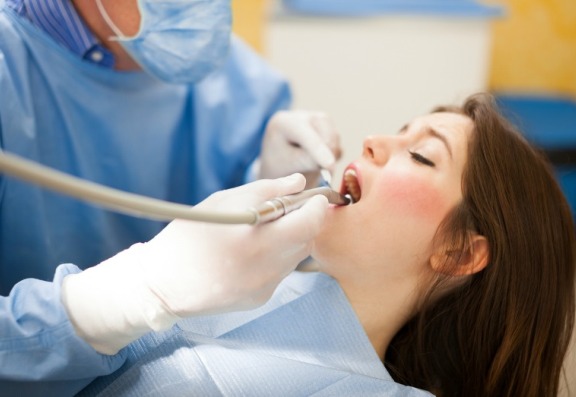
Root canal treatment dental services Rochdale right now: You can be assured of the very best attention and care from our Rochdale dentists. We are proud to have a 5* rated, friendly and highly qualified team with great expertise in their fields. Highly experienced specialist dentists: We are proud to have a extremely dedicated, caring and experienced dental team that has over 60 years combined extensive dentistry experience. Our team, led by prinicipal dentist Zainub Rizvi (GDC No: 258774), also includes an implant surgeon, a specialist Endodontist (root canals) and a specialist Orthodontist (teeth straightening). Find additional details on general dentistry in Rochdale.
Gum disease or periodontitis is a common but serious infection of the soft tissues around your teeth. If gum disease is left untreated, it can damage the framework of bone tissue that supports your teeth. This can lead to the tooth becoming loose or even having to be extracted. Regular hygiene check ups will allow our team to spot any early signs of periodontitis, and remove the plaque that can cause it. The best way to avoid gum disease is through good oral hygiene, both at home and during regular visits to your dentist.
Invisalign aligners offer a discreet and comfortable alternative to traditional metal braces. It is a very desirable solution because the aligners used are clear, and very difficult to detect. Each set of aligners is created individually and fits exactly over your teeth. They work by gradually and gently moving your teeth into the correct position. Our specialist orthodontist will discuss your required results with you before the treatment starts. Once fitted you will be able to wear your aligners with confidence, and remove them for cleaning, eating or important occasions.
Ditch the Pacifier by Age 2 or 3: There are lots of good reasons to let your child use a pacifier, but in the long term it can affect how his teeth line up. It can also change the shape of the mouth. Talk to your doctor if he’s still using a pacifier past age 3. Schedule your child’s first dental appointment before their first birthday or after his or her first baby tooth is visible, whichever comes first. This visit is like a well-baby visit with your pediatrician. As kids grow up, their oral hygiene habits should grow with them. Kids have all their baby teeth by the age of 3. These are called primary teeth. Baby teeth start falling out around age 6; that’s when the permanent, or adult, teeth start coming in. Gaps between baby teeth are normal. They make room for the permanent teeth. Most permanent teeth come in by age 13.
Make an appointment. Most experts recommend a dental check-up every 6 months — more often if you have problems like gum disease. During a routine exam, your dental hygienist will remove plaque build-up that you can’t brush or floss away and look for signs of decay. They will also look for early signs of oral cancer, wear and tear from teeth grinding, and signs of gum disease.
Improved Oral Health: Once the dental implants integrate with your jawbone, they will provide enough stimulation to help prevent bone loss. Maintaining proper jawbone structure is important because it holds the natural shape of your face and helps hold any remaining teeth in place. Also, dental implants do not rely on other teeth to hold the restoration in place like partial dentures and bridges do. This extra stress puts those teeth at a higher risk for decay and infection. While dental implants do not require special maintenance beyond regular brushing and flossing, dentures must be removed and cleaned regularly. This may not bother others, but some patients may find it inconvenient. See even more info on https://www.design-dental.co.uk/.
For the most part, teeth whitening is safe—as long as it’s done correctly. What most people don’t realize before having their teeth whitened is this: because you’re dealing with live tissue (unlike hair or nails), teeth whitening can cause damage, pain, and sensitivity. The safest way to use a whitening agent like peroxide is to have a custom tray created by your dentist, then use gel refills to freshen your tooth color every 24-48 months. I’ll cover these in detail below, but there are several methods of teeth whitening I do not recommend because of safety concerns.
The antibiotic tetracycline causes gray teeth in children whose teeth are still developing. Antibacterial mouthwashes that contain chlorhexidine or cetylpyridinium chloride can also stain teeth. Some antihistamines, antipsychotic drugs, and blood pressure medications cause tooth stains, as can iron and excess fluoride. If bleaching doesn’t help, ask your dentist about dental bonding, in which a tooth-colored material is applied to teeth.
